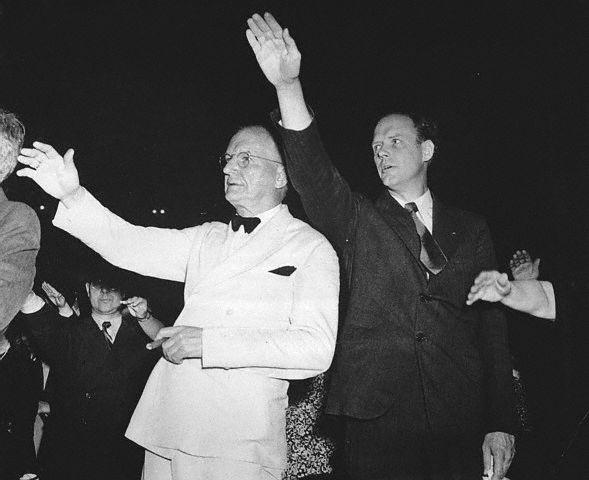The Lindberghs had seen the effect of Nazism on a revitalized Germany in 1936. That year, Charles was asked by the American military attaché in Berlin to report on the state of Germany's military aviation program. While in Germany, Charles and Anne attended the Summer Olympic games as the special guests of Field Marshal Hermann Goering, the head of the German military air force, the Luftwaffe. Lindbergh toured German factories, took the controls of state-of-the-art bombers, and noted the multiplying airfields. He visited Germany twice during the next two years. With each visit, he became more impressed with the German military and the German people. He was soon convinced that no other power in Europe could stand up to Germany in the event of war. "The organized vitality of Germany was what most impressed me: the unceasing activity of the people, and the convinced dictatorial direction to create the new factories, airfields, and research laboratories...," Lindbergh recalled in "Autobiography of Values." His wife drew similar conclusions. "...I have never in my life been so conscious of such a directed force. It is thrilling when seen manifested in the energy, pride, and morale of the people--especially the young people," she wrote in "The Flower and the Nettle." By 1938, the Lindberghs were making plans to move to Berlin.
 In October 1938, Lindbergh was presented by Goering, on behalf of the Fuehrer, the Service Cross of the German Eagle for his contributions to aviation. News of Nazi persecution of Jews had been filtering out of Germany for some time, and many people were repulsed by the sight of an American hero wearing a Nazi decoration. Lindbergh, by all appearances, considered the medal to be just another commendation. No different than all the others. Many considered this attitude to be naive, at best. Others saw it as an outright acceptance of Nazi policies. Less than a month after the presenting of the medal, the Nazis orchestrated a brutal assault on Jews that came to be known as Kristallnacht, the night of broken glass. Nazis and their sympathizers smashed the windows of Jewish businesses, burned homes and synagogues, and left scores dead. Between 20,000 and 30,000 Jews were arrested and sent to concentration camps. The Lindberghs decided to cancel their plans to move to Germany.
In October 1938, Lindbergh was presented by Goering, on behalf of the Fuehrer, the Service Cross of the German Eagle for his contributions to aviation. News of Nazi persecution of Jews had been filtering out of Germany for some time, and many people were repulsed by the sight of an American hero wearing a Nazi decoration. Lindbergh, by all appearances, considered the medal to be just another commendation. No different than all the others. Many considered this attitude to be naive, at best. Others saw it as an outright acceptance of Nazi policies. Less than a month after the presenting of the medal, the Nazis orchestrated a brutal assault on Jews that came to be known as Kristallnacht, the night of broken glass. Nazis and their sympathizers smashed the windows of Jewish businesses, burned homes and synagogues, and left scores dead. Between 20,000 and 30,000 Jews were arrested and sent to concentration camps. The Lindberghs decided to cancel their plans to move to Germany.
Having returned to America in April 1939, Lindbergh turned his attention toward keeping his country out of a war in Europe. At the time, most Americans shared his isolationist views. Germany invaded Poland five months later, drawing Britain and France into the war. Two weeks later, Lindbergh delivered his first nationwide radio address in which he urged America to remain neutral. In the speech he criticized President Roosevelt, who believed the Nazis must be stopped in their conquest of Europe. Lindbergh saw Nazi victory as certain and thought America's attention should be placed elsewhere. "These wars in Europe are not wars in which our civilization is defending itself against some Asiatic intruder... This is not a question of banding together to defend the white race against foreign invasion." Building on his belief that "racial strength is vital," Lindbergh published an article in Reader's Digest stating, "That our civilization depends on a Western wall of race and arms which can hold back... the infiltration of inferior blood."
